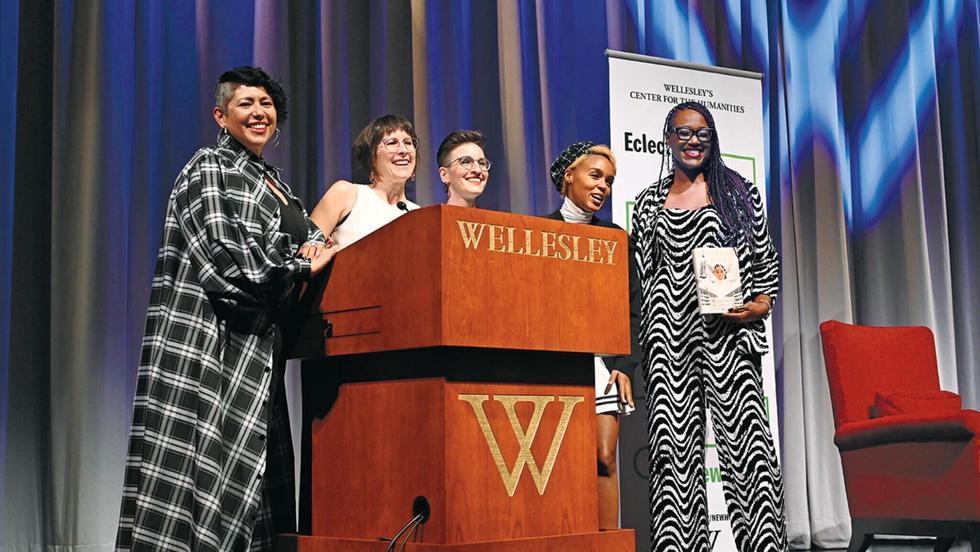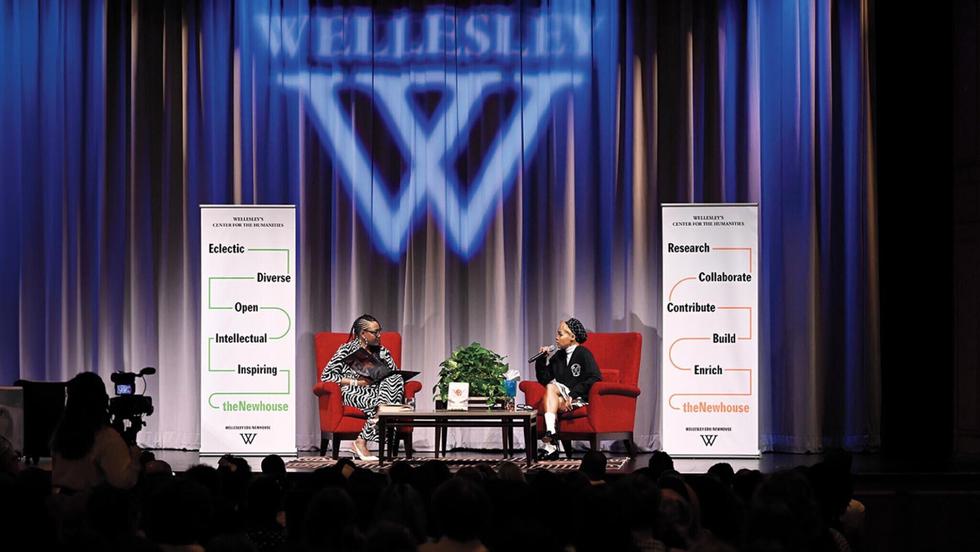“We talk about the Newhouse as a home,” says Lauren Cote, the Suzy Newhouse Center for the Humanities’ event and program manager. “I think without the physical space, which affords proximity to one another for formal and informal engagements, we would not be able to do the community building that we’ve done.” Currently celebrating its 20th year, the center opened in 2004 in Green Hall (in the former admissions offices, for campus historians). Dedicated to all forms of the humanities, the Newhouse gives time, space, and support to residential fellows. To the greater College community, it offers a panoply of programming, from lectures to book launches to marquee events—such as the 10-time Grammy nominee singer-songwriter-rapper-actor, self-described world-maker Janelle Monáe in conversation with Nikki Greene, associate professor of art history, on Nov. 22, 2024.
Taking the reins as co-directors in summer 2023, Irene Mata, associate professor of American studies and faculty director of the Mellon Mays Undergraduate Fellowship Program, and Julie Walsh, associate professor of philosophy, along with Cote, take an expansive approach to their programming, intentionally including staff and students— “anyone with an interest in humanities or humanistic social sciences,” says Walsh. That interdisciplinary approach encompasses inquiries that are usually found in the technical fields, e.g., computer science or economics. “We firmly believe that humanistic methodologies and inquiry are required to pair with other disciplines, to not just deal with the present moment but build the future we want to live in,” she says
“As a site of humanistic inquiry, the center can bring us together as a community to think about these difficult times and challenges that we’re facing.”
A great example is this year’s Jordan Lecture, by Safiya Noble, author of Algorithms of Oppression: How Search Engines Reinforce Racism. (Originally scheduled for November, the lecture was postponed to a spring date to be determined.) In 2010, running a Google search on behalf of her stepdaughters and nieces, Noble typed in “Black girls.” The first hit was a pornography website. Though not trained in a technical field, Noble was determined to understand and disseminate her findings on how and why Google’s algorithm reinforced and created new forms of what she termed “technological redlining.”
“One of the things about the humanities is that it’s so deeply dependent on storytelling,” says Mata. “We have the opportunity at the Newhouse to bring in extraordinary storytellers who are telling stories about communities that we may not know about, and their stories oftentimes stand in opposition to previous stories”—such as the idea that Google is a neutral, objective mechanism. “It activates change within our community.”
Events that draw big audiences—such as the 2023 lecture by acclaimed author and Mary L. Cornille Distinguished Visiting Professor in the Humanities Haruki Murakami—take place in Alumnae Hall, but the Newhouse’s curated conversations, lectures by visiting scholars and authors (including many whose work has been banned), and book launch celebrations for Wellesley faculty and alums are held in the Center’s splendid lounge in Green Hall. The lounge is also a hub for Newhouse fellows, a group of Wellesley faculty (on sabbatical or during the summer), faculty from other institutions, and 10 Mellon Mays Fellows, a cohort of Wellesley juniors and seniors who undertake an intense program of research in addition to their normal course load, and present their findings at conferences and other venues.
Newhouse and Mellon Mays fellows’ backgrounds, research, and work resist categorization, but there is a shared passion for investigating the big questions of our times, a passion that is fundamental to the Newhouse. “As a site of humanistic inquiry, the center can bring us together as a community to think about these difficult times and challenges that we’re facing, not just at Wellesley but outside of our small, insular community,” says Mata. “Even amongst this chaos that we’re experiencing outside, we have a space here that holds us and supports us and supports a vision for a better world, which is what humanistic thinking is all about.”


The Newhouse’s Origins
Suzy Marley Newhouse ’55 (1935–2015) established the Newhouse with her husband, Donald, and dedicated her life to public service and the arts. Alongside her involvement with Wellesley, she was a trustee of the New York Public Library and chair of the Fresh Air Fund. Newhouse described her years at Wellesley as formative. “I had a sheltered early life and found Wellesley’s boundless offerings and small classes forced personal growth, while the exposure to women, think-ing women, talking women, excited women from every state and many foreign countries, expanded my horizons,” she said. Donald recently recalled, “My sweet Suzy’s interests were in courses that fell under the umbrella term ‘humanities’. Her interest in these courses were supported by President Diana Chapman Walsh ’66, who believed that a well-rounded education had to include courses in the humanities. And thus the Suzy Newhouse Center for the Humanities was born.” The Newhouse’s engagement with the class of 1955 has continued, as it hosted acclaimed artist Lorraine O’Grady ’55 for a five-day residency last year. (Sadly, O’Grady passed away on Dec. 13, 2024.) The Newhouse is hosting a tea during reunion 2025—all members of the class of ’55 are welcome.




Post a Comment
We ask that those who engage in Wellesley magazine's online community act with honesty, integrity, and respect. (Remember the honor code, alums?) We reserve the right to remove comments by impersonators or comments that are not civil and relevant to the subject at hand. By posting here, you are permitting Wellesley magazine to edit and republish your comment in all media. Please remember that all posts are public.